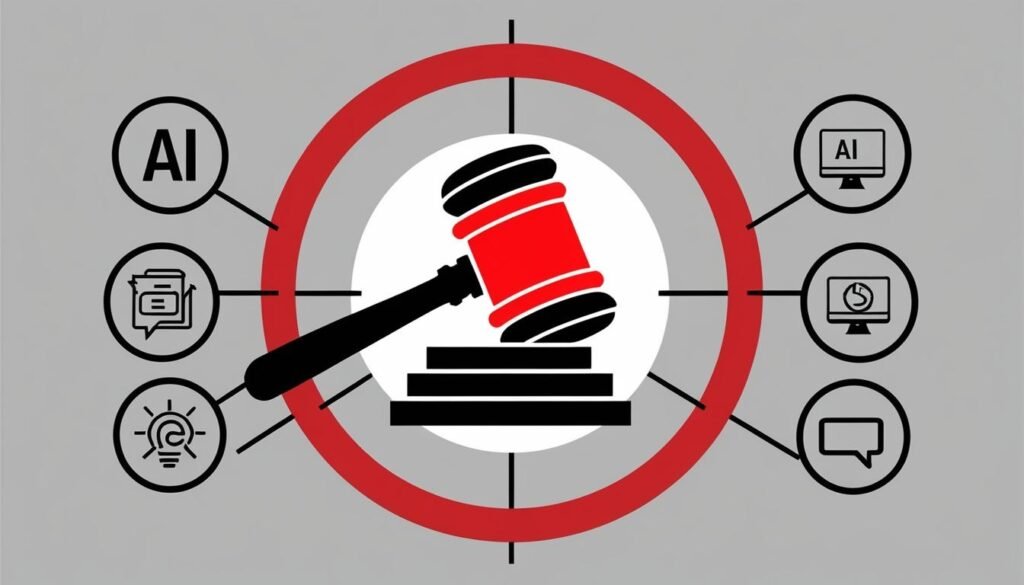As discussions around AI regulation intensify, the challenges of misinformation and the protection of free expression take centre stage.
In a year marked by escalating discussions regarding the regulation of artificial intelligence (AI), the implications for free expression and information sharing are becoming increasingly paramount. The Los Angeles Times has reported on significant actions taken by various levels of government in response to AI’s rapid evolution and its potential to disseminate misinformation.
In 2021, the facade of the Newseum in Washington, bearing the text of the 1st Amendment, was removed as a poignant backdrop to these ongoing debates. The essence of these discussions is captured in a reaffirmation by the Supreme Court, reinforcing that the principles embedded in the 1st Amendment—freedom of speech and press—remain applicable even as communication technologies advance. Notably, the late Justice Antonin Scalia articulated this enduring principle in 2011, suggesting that the challenges posed by new technologies do not diminish the foundational rights to free expression.
Amidst concerns regarding misinformation that could be exacerbated by AI, lawmakers in at least 45 states have proposed regulation bills this year, with 31 states enacting some form of legislation or resolutions on the subject. This increased legislative activity is being paralleled by congressional consideration of AI regulations. For instance, California has introduced specific legislation aimed at regulating “deceptive” digitally manipulated content relating to political candidates. This move was catalysed by an AI-generated parody video of Vice President Kamala Harris that gained virality earlier in the summer. However, this law faced legal challenges shortly after its enactment, with a judge blocking it on the grounds that the right to criticise government is enshrined in the Constitution, “even in the new technological age.”
While these responses to AI are often motivated by legitimate concerns regarding misinformation, critics argue that such regulations misinterpret the application of the 1st Amendment. As Justice Robert Jackson noted in 1945, trusting the government to differentiate truth from falsehood poses significant challenges, thereby placing the onus of discerning truth on individuals.
Nico Perrino, executive vice president of the Foundation for Individual Rights and Expression and host of “So to Speak: The Free Speech Podcast,” emphasises that existing laws, such as those addressing defamation and fraud, are already adequately equipped to manage several potential harms associated with AI, without the need for new laws. These laws are considered applicable regardless of whether the deceptive practices stem from traditional media or advanced AI technologies. He argues for the protection of knowledge-generating tools as being fundamentally linked to the pursuit of information and progress.
The implications of AI technologies, particularly in enhancing knowledge production, cannot be overstated. A recent study at the Massachusetts Institute of Technology indicated that AI could help discover 44% more new compounds in a materials science lab, showcasing AI’s potential utility in scientific advancements. Additionally, Dario Amodei, CEO of Anthropic, has posited that advancements in AI could accelerate progress in biology and medicine, potentially compressing what would traditionally take decades into a mere handful of years.
As AI continues to evolve, the pressing need to balance regulation without impeding creative and learning opportunities poses challenges for lawmakers. It is observed that the trajectory of AI may very well shape the future of information sharing as significantly as the printing press did during the Enlightenment. The outcomes of ongoing legislative efforts in relation to AI will likely play a crucial role in determining how knowledge is generated and disseminated in the contemporary landscape.
Source: Noah Wire Services
- https://www.techpolicy.press/safeguarding-freedom-of-expression-in-the-ai-era/ – Discusses the European Union’s AI Act and its implications for freedom of expression, including the development of the General-Purpose AI Code of Practice to mitigate systemic risks and protect freedom of expression.
- https://www.cato.org/sites/cato.org/files/2024-06/Briefing-Paper-178.pdf – Explores how AI regulation can threaten free expression, highlighting the risks of government overregulation and the importance of a pro-innovation approach to AI development.
- https://www.cato.org/sites/cato.org/files/2024-06/Briefing-Paper-178.pdf – Details the potential of AI to expand free expression and the challenges posed by regulatory efforts, including the impact on innovation and market diversity.
- https://www.techpolicy.press/safeguarding-freedom-of-expression-in-the-ai-era/ – Mentions the public consultation on ‘trustworthy general-purpose AI’ by the European Commission and the need to ensure freedom of expression is considered in AI risk assessment and mitigation.
- https://www.cato.org/sites/cato.org/files/2024-06/Briefing-Paper-178.pdf – Cites the example of legislative efforts in the U.S., such as the AI framework proposed by Senators Josh Hawley and Richard Blumenthal, and the potential impact on free expression.
- https://www.techpolicy.press/safeguarding-freedom-of-expression-in-the-ai-era/ – Highlights the importance of human rights standards in guiding AI regulations to protect freedom of expression, ensuring content restrictions are legitimate and proportionate.
- https://www.cato.org/sites/cato.org/files/2024-06/Briefing-Paper-178.pdf – Discusses the ‘Brussels effect’ where EU laws influence AI innovation globally, potentially limiting the diversity of AI options available due to stricter regulations.
- https://www.cato.org/sites/cato.org/files/2024-06/Briefing-Paper-178.pdf – Argues that existing laws addressing defamation and fraud are sufficient to manage harms associated with AI, reducing the need for new regulations that could impede free expression.
- https://www.techpolicy.press/safeguarding-freedom-of-expression-in-the-ai-era/ – Emphasizes the role of civil society and freedom of expression advocates in ensuring that AI regulations do not unduly restrict freedom of expression.
- https://www.cato.org/sites/cato.org/files/2024-06/Briefing-Paper-178.pdf – Supports the idea that a risk-based, pro-innovation approach to AI development is necessary to expand expression-supported AI without stifling innovation.
- https://www.cato.org/sites/cato.org/files/2024-06/Briefing-Paper-178.pdf – Highlights the potential of AI in advancing human knowledge and progress, particularly in fields like science, technology, and medicine.















